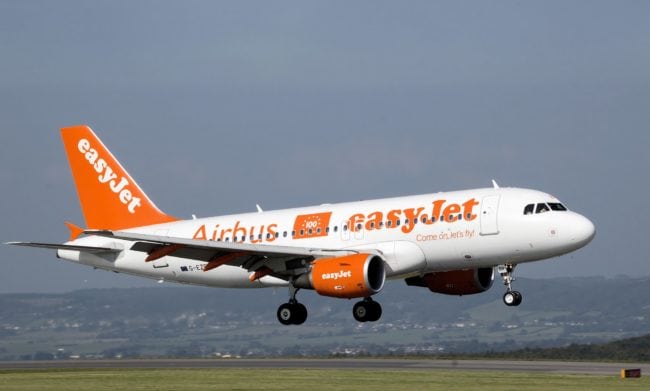
(Easyjet)
EasyJet, the world’s largest operator of the Airbus A319, will establish as many as 50 different predictive maintenance algorithms on board its in-service fleet by the end of this year.
At the 2018 Aviation Electronics Europe conference and exhibition in Munich, the low-cost carrier’s head of maintenance operations explained how EasyJet is learning to use the Airbus SkyWise platform to improve its aircraft maintenance workflow.
The journey to establishing predictive maintenance journey for EasyJet has been driven by two key technologies, including the onboard flight operations and maintenance exchanger (FOMAX) and the off-board Skywise open aviation data analytics tool.
FOMAX is Rockwell Collins’ secure server router and compact connectivity unit that gathers aircraft maintenance and performance data and automatically send it to maintenance control center engineers and technicians. SkyWise is the new singular access point to data analytics designed to combine multiple sources into one secure cloud-based platform, developed in partnership by Airbus and Palantir Technologies.
“The system itself, in very, very basic terms, has the FOMAX box, which gets all of the info from the FDIMU (flight data interface management unit) on the aircraft,” said Aidan Kearney, EasyJet’s head of maintenance operations. “It then feeds that data into the FOMAX box, which is a 4G router. Then when the aircraft lands, it transmits the information across to be analyzed by Airbus.”
According to Kearney, a key enabler of the airline’s predictive maintenance concept is the software application on the FDIMU that captures all of the data traveling around the ARINC 429 buses of the aircraft and sends it to the FOMAX box. When the aircraft lands, the FOMAX router system transmits the data to the Skywise analytics platform using 4G Gatelink antennas.
Airbus analyzes the data using internally developed modeling capable of predicting upcoming system failures. Airbus then transmits the data to EasyJet to allow the airline to make the predictive maintenance decisions of its choosing.
Through this process, EasyJet is able to look at the fault, determine the cause and then write an algorithm to detect it on all flights moving forward.
“We’re looking at air conditioning, flow control valves, electrical power, and IDGs (integrated drive generators) are another very good example for us and in terms of reliability and positive findings,” Kearney said, “There’s also flight control systems, flaps and proximity sensors, fuel, actuaries and pumps, hydraulic reservoir temperatures; there’s a lot of opportunity.”
Dividing its aircraft health parameters into different categories including systems, bird strikes and environmental issues, the airline has found that 83% of aircraft performance issues are caused by aircraft systems.
FOMAX-enabled A320s capture more than 24,000 health parameters, or 100% of the available data generated by the aircraft systems and components, as compared to 400 health parameters, or less than 2% of the available data transmitted by its aircraft health status computers on non-FOMAX A320s, according to Airbus.
Kearney said EasyJet’s combination of Skywise and FOMAX is still in its “infancy,” despite being about three years into the program. The maintenance team is still learning to perfect the system and to determine what sets of data to capture.
The arrival of EasyJet’s first line-fit FOMAX aircraft occurred three weeks ago, and the U.K.-based carrier is currently in the process of retrofitting its first A320. It’s under a five-year Skywise contract with Airbus and plans to have its entire fleet retrofitted with FOMAX by the end of 2019.
“You don’t want to be carrying out mod after mod, adding sensors and items that aren’t needed; we must use algorithms based on the engineering data,” said Kearney. “By the end of this year, we’ll have 50 different algorithms running on the aircraft, and, as I said, the one thing that people have fear of is the NFF. While we’ve had no NFF issues, we’re working with Airbus and the OEMs to try to prove that it’s not just about benefitting the airline, it’s also about benefitting OEMs.”